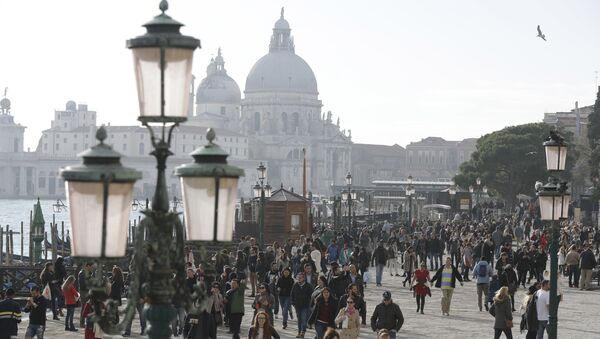Emmanuele Dal Carlo, co-founder of FairBnB.coop and native of Venice, and Margarita Goroskhevich, founder of Allriot Clothing, a London-based ethical clothing brand, discussed how their business models were helping to contribute real change to the industries and local communities involved.
Educating Travellers on the Challenges of Sustainable Tourism
Awareness was the “first step” to help “turn problems into opportunities for people and the planet”, Mr Dal Carlo says, citing figures that tourism had grown sevenfold over the last 40 years. Such unprecedented growth was contributing to growing gentrification in cities and increased pressure on natural resources, he added.
Despite this, the industry accounted for over 10 percent of global GDP, and promoting local economies via initiative networks as a “single circular economy” was important, he adds, citing figures from the World Travel and Tourism Council.
He added that sustainable tourism could become “a great resource” to empower communities to tackle such issues and educating travellers could have “a huge impact on local economies and the environment”.

A rise in booking platforms have led to “complex” problems, with many offering tourists “easy and cheap” trips, empowering small hosts in the short-term but later "distorted" the industry, Mr Dal Carlo says.
He says: “Existing platforms had initially been a tool for helping people to rent out their second house or spare rooms, but later enabled a small group of landlords with several apartments to speculate.
In some cities, single hosts and investment funds held "not just two or three, but dozens or even hundreds" of homes, he says.
He adds: “The problem is that such greed can change a potentially positive tool into a damaging instrument. Promoting fair hosts and demanding closer scrutiny is a start to tackling the problem.
FairBnB's Plan to Build Sustainable Travel Business Model
Mr Dal Carlo says that the cooperative donates half of the 15 percent commission from bookings to fund social projects and tackle local issues, including building community spaces and larger ones on social housing and rising unemployment. Ideas were chosen by locals and later, travellers via the website platform.
— Fairbnb.coop (@Fairbnb_coop) November 16, 2019
For examples, he explains that guests renting an apartment in Bologna for two nights at €115 would contribute €100 to the hosts, €7.5 to developing the platform and a further €7.5 towards a local project.
The cooperative had received “overwhelming” support from hundreds of groups and users globally, and word of mouth campaigns saw over 10,000 registered users and further coverage worldwide, Dal Carlo reveals.
Hosts were enthusiastic to spend money on local communities instead of "untaxed earnings to shareholders or platforms based on venture capital investors", he says.
— Ali Ercan (@aliercan79) November 9, 2019
Tourists can support the project by word of mouth, as well as offer ideas and feedback to test and improve the platform’s user experience, as well as join local groups to build partnerships and projects.
New travel destinations were updated after receiving 20 hosts in a community, with the cooperative planning to expand further in the summer this year, he says.
Sustainable travel was “much more than accommodations”, but also about “where you shop, what you consume and, in general, how you experience a city”, he says.
He says: “For example, a community proposal for a social project funded by FairBnB in Bergamo was to build cooperative markets with local products and shops, but in other cities, communities proposed a cooperative restaurant, among other things. These initiatives encourage tourists to shop and eat in local places.
Governments could also work to quickly address issues that were transforming cities for the worse as well as “facilitating cultural loss and disintegrating local communities”, Mr Dal Carlo says.
Local municipalities could also back similar initiatives and startups to “accelerate the adoption of new sustainable tourism models” via data sharing and working with locals to find solutions to problems, he adds.
The Fads of Fast Fashion: The Global Hyperconsumerism Fetish
Allriot founder Margarita Goroskhevich says her brand believed in “taking powerful actions” on what consumers wanted for the planet, leading to her company’s business model.
Her company ethos aimed to build social change with "responsible business practices" to empower each person in the brand, from the producers to the consumers.
She explains that her brand searched for "creative ways" to lesson its environmental impact by "running a very tight ship" and following lean manufacturing strategies.
Allriot aimed at reducing dead stocks - a common problems in the fashion industry - by following a "no-waste policy" and donating unsold stocks to fundraise for charities.
Ms Goroskhevich says: "This not only strict adherence to sweatshop-free and eco-friendly manufacturing standards, but also ethical marketing and advertising strategies that respect our customers, including avoiding website popups and a commitment to purpose-driven designs.
— Ethical Brand (@ethicalbrand) January 6, 2020
Fast fashion was "a race against time", she explained, adding that "yesterday's trendy garments fill today's sales racks".
The fashion industry's goal was to make consumers "dissatisfied" with recent purchases, with trend cycles rapidly speeding to a point where traditional seasons were replaced by "faster production driven by emerging trends", Ms Goroskhevich said.
She adds: "It is not uncommon for retailers to introduce new products multiple times in a single week to stay on trend.
Fast fashion was the result of "growing consumer desire for speed and value, fuelled by an abundance of choice", she says, and the fashion industry's competitive nature forced retaillers to "cut environmental corners in the name of profit".
Allriot's founder urged buyers to "prioritise sustainability over instant gratification" by "taking responsibility" for their shopping habits.
The brand has also campaigned against Prime Day and Black Friday, as well as educated consumers on tactics used by online retailers to boost sales via fast fashion, she explains.


